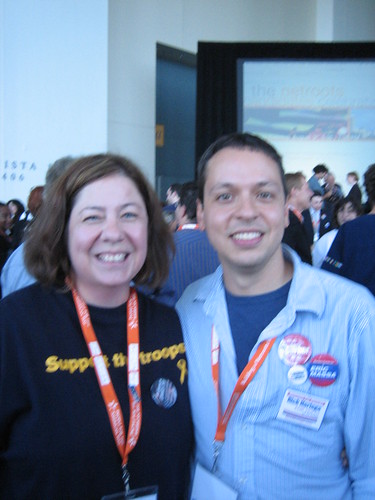Here's an idea: Stand up against corruption.
Are you being railroaded by the North Carolina Railroad? Click on the link to learn what can happen when the North Carolina Railroad Knocks On Your Door.
Thursday, August 16, 2007
Sunday, August 05, 2007
Bora's interview with John Edwards
Don't miss Idea Consultant Bora's interview with John Edwards.
excerpt:

Benny and Markos
Benny attended the Yearly Kos convention this weekend and you can read her thoughts at Benny's World.
excerpt:
Q: If elected President, what can you do, and what you intend to do to reverse the anti-science trend seen in the USA over the past several years? What is your role as President to enhance public understanding of science and what can you do to ensure quality science education in all public schools in the country at all levels?
SEN EDWARDS: For the sake of our future, we need to start young. Our education system shortchanges the skills our children need for the future--math and science, creativity and critical thinking. Every day you can read reports about how we're falling behind in math and science--our 9th-graders are 18th in the world in science education. We need to invest in the next generation of math and science teachers for our schools. Ninety-five percent of urban high schools report problems getting qualified science teachers. We need higher pay for teachers, college loan forgiveness, and better teacher training programs.
We also need more kids going to college. I will create a national initiative called College for Everyone to pay one year of public-college tuition, fees, and books for more than 2 million students. If we are to compete in the new global economy we must emphasize science, engineering and other technical fields in our education system.
Q: In your opinion, what kind of healthcare system would be best poised to respond quickly and efficiently to threats such as avian flu or a bioterrorist attack, and what can a President do to enact such a radical change in the healthcare system?
SEN. EDWARDS: Right now, we are unprepared for a serious flu outbreak or bioterrorist attack. If such a crisis were to unfold--God forbid--think about what would happen. To start, some people may not even go to the hospital because they don't have health care. 45 million of us lack basic health care. Those who do go would probably go directly to emergency rooms, which are overcrowded and understaffed. Doctors and nurses in these emergency rooms are often forced to treat these patients without proper patient medical records because of our failure to switch to electronic medical records. Finally, it is possible for hundreds of people to be the victims of an outbreak or attack without anyone ever connecting the dots. Currently, it takes several days for the government to learn about two key factors in any disease outbreak: the progression of the disease through different communities and the availability of vaccine to respond to the disease.
There are some immediate steps we can take to ensure that we are prepared for an outbreak or an attack. First, we need to ensure that people are willing to seek health care if they are sick because they are not worried about paying the bills. Second, we need to bring information technology to our entire health care system so that doctors and nurses who are treating patients have adequate medical records. Third, we need to establish a real-time, unified national tracking system for diseases and for vaccines. Such a system will be easily accessible to public health officials so they can learn how a disease is moving and where to get vaccines.
It's critical that we maintain a health care safety net that includes public hospitals, clinics, and community health centers. Public hospitals are critical for the valuable trauma and emergency care needed to respond to a public health crisis or bioterrorist attack.
On the federal level, we need better coordination. Over 200 government offices are potentially involved in responding, and I'm concerned that there is not an adequate national plan for coordination and leadership in the event of an epidemic or attack. It is the federal government's duty to ensure adequate stockpiles of vaccines and antibiotics and to help state and local governments become better prepared for a bioterrorist attack. The federal government also has the responsibility for agricultural and food inspections, which is a critical part of preventing potential public health crises. These are all issues I worked on in the Senate.

Benny and Markos
Benny attended the Yearly Kos convention this weekend and you can read her thoughts at Benny's World.
Subscribe to:
Posts (Atom)
